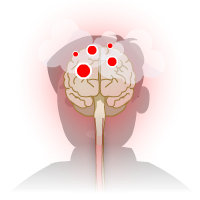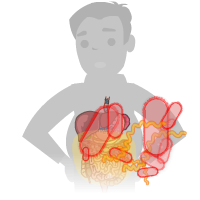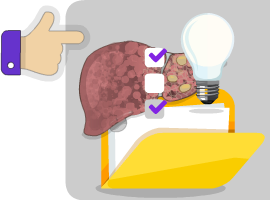When to Get Help:
If you have cirrhosis and get any of the symptoms below, DO NOT DRIVE. Call 911 or get someone to take you to an emergency room immediately. Say you have cirrhosis, and describe what’s happening to you.
| Cirrhosis Complication | Symptoms | |
|---|---|---|
| Bleeding Varices Bleeding from varices (enlarged veins) in the esophagus (food pipe) or stomach bursting open |  | You vomit blood or something that looks like coffee grounds You have black, tar-like bowel movements |
| Encephalopathy Confusion or sleepiness from a buildup of toxins in the blood |  | You have a fever You have severe confusion or sleepiness You can’t speak, walk, or follow directions properly You have severe nausea and vomiting |
| Infection in Ascites or Pleural Fluid Infection in fluid buildup in the abdomen (belly) or around the lungs |  | You have new or sharp pain in your belly or chest that doesn’t go away You have a fever You have trouble breathing You have severe nausea and vomiting |
| Jaundice Yellowing of the eyes and skin |  | Your eyes and skin have suddenly turned yellow |
The Green sleeve
The Green sleeve is a plastic pocket that holds important Advance Care Planning documents and other forms that outline a patient’s goals for health care. It is given to patients cared for in AHS who have had discussions, or completed documents, that refer to decision-making about their current or future health care. The information contained in the Green Sleeve is to give all health care providers, in any setting, access to a patient’s goals of care and interventional guidelines that have been discussed with the patient.
- Take it with you to medical appointments or if you go to the hospital. Don’t forget to bring it home!
- When at home keep your Green Sleeve on or near your fridge. If you have to call 9-1-1 emergency responders will look for it there.
Note: This section was adapted from content on MyHealth.Alberta.ca.
References:
The information on this page was adapted (with permission) from the references below, by the Cirrhosis Care Alberta project team (physicians, nurse practitioners, registered nurses, registered dietitians, physiotherapists, pharmacists, and patient advisors).
This information is not intended to replace advice from your healthcare team. They know your medical situation best. Always follow your healthcare team’s advice.
References:

